
Yetunde Akinlaja
Department of Physiology and Neurobiology, UConn
Advisor: Akiko Nishiyama
Entered Graduate Program: 2021
Research Interests: Neuroglia interactions
My interest is to define the interactions between glia and neurons especially in disease conditions like seizures and schizophrenia. Specifically the roles of Oligodendrocyte precursor cells when there are changes in neuronal activity.

Katelyn Denegre
Department of Molecular and Cell Biology, UConn
Advisor: Michael O'Neill
Entered Graduate Program: 2017
Research Interests: genetics, epigenetics
I am involved in two projects as part of my research. The first project is a detailed exploration of our gene of interest, Xlr3 and its involvement in male reproduction. In short, this work uses wild type and Xlr3 transgenic mice to perform a gross histological assessment of the testis and meiotic spermatocyte surface spreads to take a detailed look at Xlr3’s involvement in Meiotic Sex Chromosome Inactivation (MSCI) during prophase I. The second project I am involved with, uses a novel breeding scheme to track transmission of the X chromosome across generations and explores the consequences of disrupting meiosis in one generation and the downstream effects on behavior and neurodevelopment in the next two generations. Xlr3b imprint is disrupted in the brains of female mice whose fathers have disrupted MSCI because of the Xlr3 transgene. It is the sperm from these fathers that possess an epimutated X chromosome which they are passing on to the daughters. Additionally, the grandsons of these male mice have behavioral differences when compared to wild type counterparts. Overall, this project explores transgenerational epigenetic inheritance and suggests that disrupted MSCI leads to the production of epimutated sperm which then affects neurodevelopment and behavior in subsequent generations. This work is important because it proposes a clearcut mechanism by which transgenerational epigenetic inheritance is occurring in this system. Most studies on transgenerational epigenetic inheritance are observational in nature and thus lack a mechanism to explain the phenomenon.
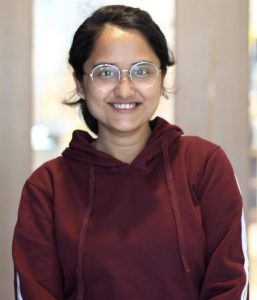
Suparna Dutta
Department of Molecular and Cell Biology, UConn
Advisor: Stacey Hanlon
Entered Graduate Program: 2023
Research Interests: Genetics, Genomics, Chromosome segregation, Nondisjunction, Meiotic Drive
I study how the supernumery B chromosomes affects the segregation of the essential chromosomes, especially fourth chromosome. My work involves looking at the nondisjunction induced by the B chromosomes and the interraction between B chromosomes and Chromosome 4.

Katherine Fleck
Department of Molecular and Cell Biology, UConn
Advisor: Jelena Erceg
Entered Graduate Program: 2021
Research Interests: 3D Genome Organization, Genome Structure and Function, Gene Evolution, Gene Regulation
My research interests include the evolution of human genes along with their function and regulation in the context of 3D genomic organization. Additionally, how the interplay between these gene features may change with disease states in order to better understand genome structure and function.
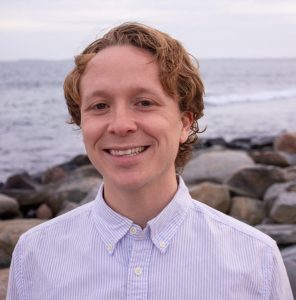
Lucas Jones
Department of Marine Sciences, UConn
Advisor: Hannes Baumann
Entered Graduate Program: 2019
Research Interests: Population Genomics, Transcriptomics
Research currently involves leveraging novel genomic approaches to gain a mechanistic understanding of organismal response to climate change. Lucas is particularly interested in low-coverage, whole genome sequencing approaches and bioinformatic tools to process large data sets which will help us better understand how organisms will deal with environmental stressors.
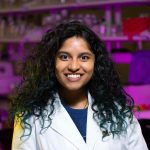
Shania Kalladanthyil
Department of Molecular and Cell Biology, UConn
Advisor: Stacey Hanlon
Entered Graduate Program: 2022
Research Interests: Genetics and Genomics
I am interested in studying the composition and origin of the B chromosomes in Drosophila to understand more about the birth of new chromosomes and how genomes evolve.

Mengjia Lin
Department of Molecular and Cell Biology, UConn
Advisor: Stacey Hanlon
Entered Graduate Program: 2021
Research Interests: Genetics
B chromosomes are extra, non-essential chromosomes that have been found in hundreds of different species including plants, insects, and mammals. In Drosophila, B chromosomes are heterochromatic and are transmitted in a biased manner during female meiosis. However, the mechanism behind the biased transmission is currently unknown. Therefore, my goal is to understand the dynamics of the B chromosomes during the meiotic divisions in females.
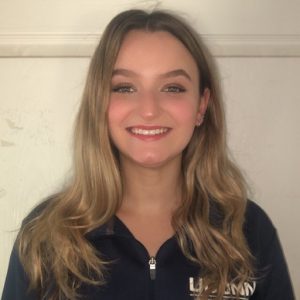
Rachael Massey
Biomedical Science, UConn Health
Advisor: Stefan Pinter
Entered Graduate Program: 2022
Research Interests: Cytogenetics, Chromosome Biology, Molecular Genetics, Clinical Genetics, Human Pathology
Rachael Massey is a clinically certified cytogenetic technologist (ASCP) and graduate student in Dr. Stefan Pinter's lab. From a young age, Rachael's family history fostered her interest in studying human disease pathology. She expanded her love for chromosomes while working as a cytogenetic technologist at a clinical diagnostic laboratory. She later joined the ISG's Health Care Genetics PSM program, working as a program representative and graduate assistant for Dr. Judy Brown. She completed her M.S. capstone project in Dr. Alexander Jackson's laboratory, identifying diverse neuronal cell types in the mouse hypothalamus. In the year before starting her Ph.D., Rachael worked in the lab of Dr. Rachel O'Neill, assisting with karyotyping and assembling human and non-model genomes. Rachael now studies genes that escape X chromosome inactivation and the implications these genes have on sex differences and sex chromosome disorders in the Pinter lab.

Michelle Neitzey
Department of Molecular and Cell Biology, UConn
Advisor: Rachel O'Neill
Entered Graduate Program: 2019
Research Interests: Biodiversity; conservation; comparative genomics; marine genomics
For my graduate work I have been sequencing, assembling, and analyzing reference genomes for species of environmental interest. These projects have included: the vulnerable and ancient Atlantic horseshoe crab, comparative deep-sea tubeworms, deep-sea coral across a chemical gradient, and the canker-riddled butternut tree.

Sean Riccard
Department of Molecular and Cell Biology, UConn
Advisor: Jelena Erceg
Entered Graduate Program: 2022
Research Interests: 3D Genome Organization, Gene Regulation, Functional Genomics, Developmental Biology
My interests include understanding the relationship between 3D genome organization and gene expression during embryonic development. Specifically, how parental genome dynamics may contribute to gene regulation and cell fate.
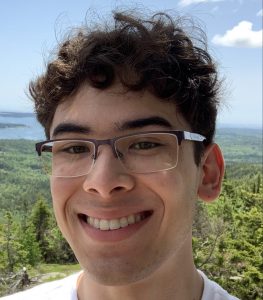
Edward Russell
Department of Molecular and Cell Biology, UConn
Advisor: Stacey Hanlon
Entered Graduate Program: 2023
Research Interests: Genetics, genomics, bioinformatics, molecular genetics
My research revolves around how the presence of a novel B chromosome will affect the Drosophila melanogaster genome at large over time and its development. To do this, I am engineering a CRISPR landing site onto our B chromosome model.

Akshada Shankar Ganesh
Department of Molecular and Cell Biology, UConn
Advisor: Jelena Erceg
Entered Graduate Program: 2023
Research Interests: 3D Genome Organization, Developmental Biology, Gene Regulation
My research aims include understanding the spatial organization of chromosomes and the potential implications for genome function. I am particularly interested in studying the dynamic nature of this organization during embryonic development.

Kaylah Samuelson
Department of Molecular and Cell Biology, UConn
Advisor: Stacey Hanlon
Entered Graduate Program: 2020
Research Interests: Genetics, Meiotic Drive, Chromosome Segregation
I study the mechanism behind drive suppression of the B chromosomes in Drosophila melanogaster, particularly a protein named Matrimony (Mtrm) that is crucial to ensure the proper segregation of chromosomes. My work looks at uncovering how Mtrm functions to prevent the biased segregation of the B chromosomes using classical Drosophila genetics and microscopy.

Cynthia Webster
Department of Ecology and Evolutionary Biology, UConn
Advisor: Jill Wegrzyn
Entered Graduate Program: 2022
Research Interests: Conservation Genomics, Bioinformatics, Transcriptomics
As a graduate student in the Plant Computational Genomics lab, I frequently utilize machine learning and computational statistics to optimize the identification of protein-coding genes. Specifically, I lead the development of EASEL (Efficient, Accurate, Scalable Eukaryotic modeLs), a tool that employs generalized hidden Markov models and random forest algorithms to improve gene prediction accuracy in eukaryotic genomes. With EASEL, I have successfully annotated genomes of non-model organisms, including Magicicada septendecula and Inga vera. In addition to software development, I mentor undergraduates in the Biodiversity and Conservation program which focuses on generating long read data for de novo genome assembly of species listed on the IUCN Red List, such as Juglans cinerea.